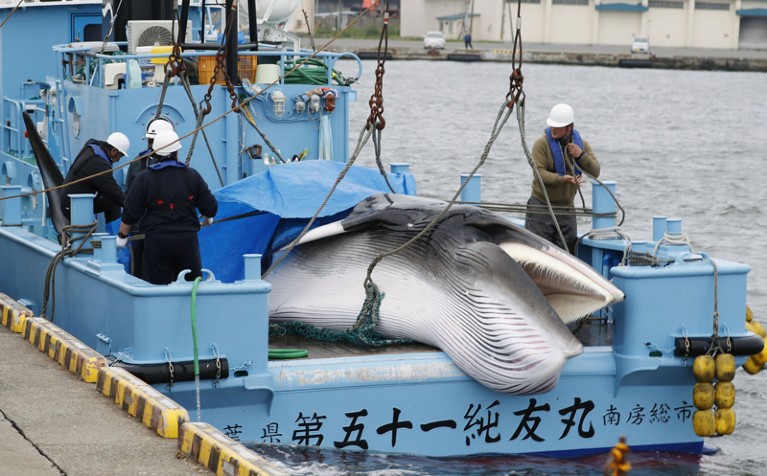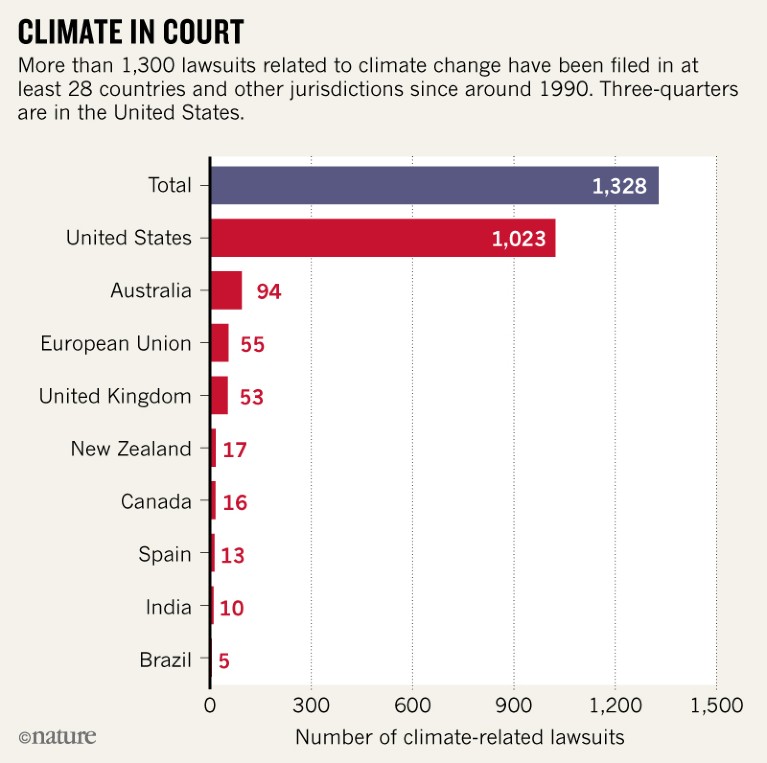EVENTS
Japan restarts commercial whale hunts After a 30-year break, Japan restarted its commercial whaling programme on 1 July, the day after withdrawing from the International Whaling Commission (IWC), a global body charged with conserving the marine mammals and regulating whaling. Hunts for small cetaceans such as minke whales will be confined to the country’s territorial waters and Japan’s exclusive economic zone, which extends 370 kilometres from the coastline. The IWC banned commercial whaling in 1985, but countries including Japan unsuccessfully lobbied to lift the moratorium. The organization made exceptions for catching whales for research purposes, and Japan had controversially continued whaling under what it claimed was a scientific programme — but in 2014, the International Court of Justice in The Hague ruled that the programme was not for research purposes.

A Minke whale landed by a Japanese fishing vessel in Hokkaido, northern Japan.Credit: Kyodo News/ Getty
Nuclear submarine Speculation is mounting over an incident in which 14 people died on a nuclear-powered Russian deep-water research vessel. According to Russia’s defence minister, smoke inhalation caused the deaths after a fire broke out in the ship’s battery compartment. The ship’s mission is officially listed as studying the Arctic sea bed in the Barents Sea. But it’s unclear what kind of research the vessel was doing, and some media reports have suggested that the research programme might be a cover for a military mission. Seven of those killed were high-ranking naval captains, and two held ‘hero of Russia’ valour medals — unusual for a routine research crew. The Kremlin said that it would not disclose information about the “absolutely secret” mission. An unnamed source in the security forces told the Russian news service RBC that the incident happened on a nuclear submarine called Losharik, which was designed for research, rescue and special military operations.
California quake Southern California experienced its first major earthquake in 20 years when a magnitude-7.1 event struck near the town of Ridgecrest, in the Mojave Desert, on 6 July. Local communities reported widespread damage, such as broken gas lines, and the shaking was felt about 200 kilometres away, in the Los Angeles area. The earthquake, which ruptured a previously unknown fault, might have been relieving stress accumulated after a magnitude-7.6 event that happened in March 1872, just to the north of the latest quake’s epicentre.
RESEARCH INTEGRITY
UK misconduct Investigations at University College London (UCL) have found that a prominent UK geneticist, David Latchman, was at fault for failing to stop scientists in his laboratory manipulating research data in more than a dozen papers he co-authored over many years, but that he did not deliberately intend to commit misconduct. In 2018, UCL decided not to take formal action against Latchman. The university last week released redacted details of its misconduct investigations and disciplinary hearings — which began five years ago and covered papers dating back to 1990 — under freedom-of-information requests from Nature and other publications. (Latchman led a laboratory at the UCL Institute of Child Health until 2003, when he moved to head Birkbeck, University of London, but he retained a part-time research role at his old lab.) So far, six papers from Latchman’s lab have been retracted, and six corrected. In a statement, Latchman said that the investigation’s assertions that he had been “inattentive” and “reckless” in overlooking deceptions were “unjust”. UCL had also begun disciplinary procedures for another scientist in Latchman’s lab, but they left the university before the procedures could be completed.
INSTITUTIONS
Hungary turmoil Hungary’s parliament ratified a controversial law on 2 July that gives the government control over the 40 or so institutes belonging to the Hungarian Academy of Sciences (HAS). The government says that its aim is to make research more innovative, but the proposal had prompted outcry from the international research community and raised concerns about academic freedom in Hungary. The law also transfers ownership of the institutes’ properties to the new government-run Eötvös Loránd Research Network (ELKH). Last month, thousands of people demonstrated in Budapest against the proposed law (pictured). In the past six months, scores of academies, universities and research institutes from across Europe have written letters in support of the HAS, which is responsible for most of Hungary’s basic research. In a 4 July statement, the European Federation of Academies of Sciences and Humanities says its academies “reject the claim of the Hungarian government that the ELKH will produce more innovative science”.

People protested in Budapest in early June against government plans to take control of the Hungarian Academy of Sciences.Credit: Zoltan Balogh/EPA-EFE/Shutterstock
University cuts Alaska’s state universities are bracing themselves for a 41% cut to their state-provided operating budget. Lawmakers had sent Alaska’s budget for the fiscal year — which began on 1 July — to Governor Mike Dunleavy for approval late last month. But, on 28 June, Dunleavy slashed the amount set aside for the University of Alaska system — which serves more than 26,000 students — to help reduce budget shortfalls. Three-quarters of the state’s legislators would have to agree for the cuts to be reversed. Alaska’s lawmakers have until the end of this week to restore the funding. If the cut becomes permanent, it would come on top of a US$5-million reduction already approved by lawmakers, bringing the state’s contribution to the university system down from $327 million last year to $192 million. After the cuts were announced, the University of Alaska put a freeze on hiring and travel. The university also said that it might have to lay off staff and remove tenured faculty members.
PEOPLE
Chaos pioneer US mathematical physicist Mitchell Feigenbaum, who introduced seminal ideas underpinning ‘chaos theory’, died on 30 June, aged 74. Chaos theory studies phenomena that are determined by their initial conditions — so are not random — but are too complex to be predictable. These systems often follow certain patterns, such as the cycles of boom and bust in population dynamics. In one of his most notable results, Feigenbaum found that some of these systems share features that are described by two universal constants now known as the Feigenbaum constants. Feigenbaum was born in Philadelphia, Pennsylvania, and worked for most of his life at Rockefeller University in New York City. He was a recipient, among other honours, of the Wolf Prize and a MacArthur ‘genius’ fellowship.
GENOMICS
African genomes A US–Nigerian genomics company has raised US$4.5 million to create what it says will become the world’s largest biobank of African DNA for academic and commercial research. The company, called 54gene, ultimately wants to plug the gap in genomic data from people of African descent, says its founder and chief executive, Abasi Ene-Obong. 54gene is working with physicians in ten Nigerian hospitals to collect samples from volunteers with conditions including cancer, heart disease, diabetes and sickle-cell disease. It hopes to gather 40,000 samples by the end of the year, and is also talking with governments in East and West Africa to source samples from countries there. He says that proceeds from commercialization of the data will go to a trust that will fund African research, but data won’t be sold to businesses that want to use it for purposes other than improving health.
TREND WATCH
Citizens and organizations have filed more than 1,300 lawsuits related to climate change in at least 28 countries around the world, an analysis has found. Of the 1,328 suits filed from 1990 to May 2019, more than three-quarters were in the United States. But the report’s authors note that the share of lawsuits filed in low- and middle-income countries such as Pakistan and Uganda is on the rise. The vast majority of suits have been filed since 2006. Most of the legal battles are against governments, in attempts to bolster action against global warming, but there are also cases against businesses, as well as some registered with international courts. Many seek to strengthen climate policies — for instance, in a landmark 2015 case in the Netherlands, a court ruled in favour of citizens urging their government to accelerate emissions reductions. The analysis, conducted by policy researchers at the London School of Economics and Political Science, notes that cases are increasingly drawing on ‘attribution science’, which aims to establish causal links between human-induced climate change and certain extreme weather events.

Source: J. Setzer & R. Byrnes Global trends in climate change litigation: 2019 snapshot (LSE, 2019).



